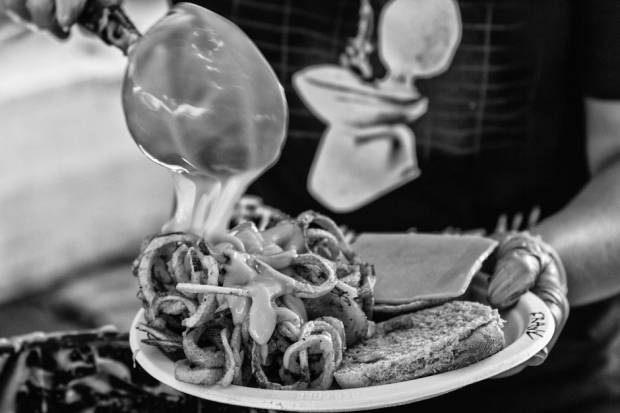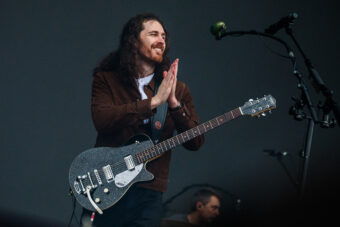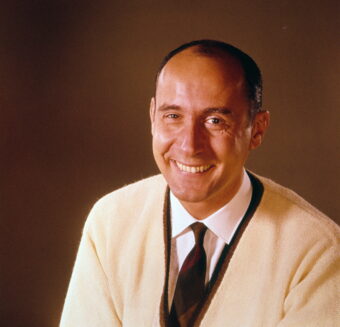On June 17, an evening when they’d originally hoped to be working the third date of Phish Fest, I rendezvous with the crew at Jo-Jo’s Italian Grille, a cheap Italian spot near Bader Field. (They’ve decided to camp outside of Atlantic City during the down week before for Orion.) It’s clear that there’s some tension. The seven-person team is having a business meeting, touching base on where they are and where they need to be in preparation for Orion Festival, the first event they’ve worked since Bonnaroo. They don’t seem happy. This is clearly a group that’s spent too much time together. There are plenty of eye rolls, and people clearly zone out when others start to talk. When the check arrives, it elicits loud groans. The meal is more expensive than everyone realized, a fact that puts their Phish-less, profit-less weekend in stark relief.
“Ugh,” Chastain mutters after they’ve settled the bill. “I just want to go back to the campground.” And that’s just what he, Garske, and Knappenberger do. The rest head to Bader Field to check out the space they’ll be working the next weekend. With a week to go and nothing to do, Orion Festival can’t come soon enough.
When Orion arrives, 99 Potatoes again underestimate the amount of customers at the festival. This time, they’re also understaffed—Magdaleno has opted to hang out in New York City with some friends for the weekend. I’m put on burger assembly. Once an order is made, I’m handed a plate, and then instructed to grab a bun and cheese. Then I get a burger from Garske, who serenely grills nearly 150 pounds of meat per day. After that, I quickly add garnishes — lettuce, pickles, sliced red onion. On a second tray, I dump regular or sweet potato curly fries. I do this until I feel like I’ve been playing pick-up basketball all day with players who throw a lot of elbows.

Also Read
Øya Fest Returns to Oslo
Each crewmember fills one role for the entire day: Beaucher and Chastain act as cashiers, Garske grills, Charlie (a fill-in who normally works with Scalia’s father), cuts the fries, Knappenberger and I plate orders, and Alter and Scalia act as utility types plugging any labor holes. Things only slow down when Metallica finally takes the stage at 10 P.M. I can feel everyone exhale.
After the last trickle of customers dries up, we begin washing the equipment, which seems to disgust everyone, even though they’ve spent hours being splashed with hot cheese and burger juice. After an interminable hour of scrubbing, we’re done. Everyone piles into the two vehicles and heads for the campground. Since there’s no camping for vendors on the festival grounds in Atlantic City, we have to drive 20 miles outside of town. When, after the WaWa detour, we arrive at the campground, we all stumble out of the cars and crash. All of us, except for Garske, who joins crew members from other Orion festival food stands around a campfire for some conversation, music, and, judging from the clinking of bottles, lots of beer.
Nearly everyone sleeps two or three to a bed, as space in the camper is limited. While it’s not ideal, all anyone wants to do is close their eyes, even if they’re going to have to sleep smooshed up against a human who smells strongly of dead animal fat. The plan is to be back at Bader Field by 9 A.M., which is now six hours away. I close my eyes to sleep. What feels like seconds later, I’m awake, the morning sun beating down, facing another day of potatoes and pain.
After Orion Fest, the 99 Potatoes team drives 850 miles to Rothbury, Michigan, for the Electric Forest Festival, which runs from June 28 to July 1. Things don’t get any easier there. Again, the Potatoes are slammed with customers, and the music, initially such a strong draw for everyone, has become an annoyance. “I remember a few times I went out to see [music],” says Garske of the electronic dance-oriented festival, “and I’d watch one song and then leave. I was just so tired. I’d just want to go to sleep.”
After Electric Forest, 99 Potatoes was confronted with a blank calendar until Bumbershoot in Seattle on Labor Day weekend. With nearly two months to kill and 2,000 miles travel, the group split up. Only some of the crew plan to reunite in the Pacific Northwest. Garske goes back to Los Angeles, and doesn’t return. Chastain decides to quit, and leaves for New York City. Knappenberger agrees to stay on until Bumbershoot, after which she hopes to find a video-editing job in Chicago.
“You need to find different people with the same mindset and things go a lot smoother,” Knappenberger tells me. “You really have to believe in what you’re doing to work 16 hours a day making burgers.”
In the weeks that follow, the ill will that surfaced at Jo-Jo’s bubbles over. Chastain sends his former co-workers an email: “I came into this expecting to have a fantastic summer making money and selling food with friends at some pretty sweet music festivals. Aside from selling food, the total opposite was true. I wasted my summer on this tour and had primarily a horrible time.”
Scalia, Beaucher, and Alter now realize they may have been optimistic about their business model. While the group didn’t want to disclose exact totals, they say that they have yet to end up in the red yet for any of this summer’s festivals. They also have a better idea what an operation their size can expect to make in the future. Big festivals like Bonnaroo will bring in upwards of $20,000; at medium-sized gigs like Electric Forest, you can earn $7,000 to $10,000; at a relatively smaller event, like Phish Festival, which drew about 15,000 attendees, you can expect to make $3,000-$5,000. But then of course, there are those weekends where things don’t go as planned, and it becomes a struggle just to cover travel expenses.
Still, Beaucher and Scalia plan to keep 99 Potatoes running during the festival off-season in Los Angeles, working concerts and street fairs. Hopefully, they can find others to commit like they have. “I just felt really good about the work I was doing,” Scalia says on the phone, looking back on her summer before Bumbershoot.
As for Alter, he plans to take a little time away from the group — maybe find a steady job — but come next summer, he’ll again be a Potato. “The opportunity is there,” he says. “We know how to do it now.” He thinks they’ve hit on something that, some golden summer, can give them the stress-free and lucrative life they dreamed of back in April. “We’re doing it the way,” he says firmly, “that we believe is the best way to sell burgers and fries.”





